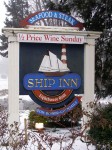“No man can be a patriot on an empty stomach.”--William Cowper Brann (1855- 1898)
Pennsylvania taverns hold an important place in the founding of our country, with establishments like Philadelphia’s City Tavern serving George Washington at a party before his inauguration. Chester County has a rich culinary heritage dating back to before the Revolutionary War. Colonial inns (places to spend the night) and taverns (for eat and drink) were havens where merchants discussed business and weary travelers rested after a long journey. As immigrants from Cheshire, England traveled along the “King’s Road” — today’s Route 30 — inns sprung up to meet their needs. The highest class was called a “stage stand”, where good food and clean linens could be found. The next tier was dubbed a “wagon stand”, where men driving teams of horses stopped for refreshment. “Drove stands” were next in quality, serving plain fare to men who mostly wanted forage for their cattle. Lowest in stature was the “tap house,” where less affluent travelers stopped for a boisterous evening of drink.
The Dilworthtown Inn
Opened in 1770, the Dilworthtown Inn was used temporarily as a prison for soldiers captured by the British after the Battle of the Brandywine. First called the Sign of the Country Farmer, its kitchen with the beehive oven was later converted into a private dining room, offering fine dining amidst colonial surroundings.
The Ship Inn
When a group of patriot soldiers sought refreshment after Brandywine, loyalist Thomas Park refused them service. Having been scorned, they shot thirteen bullets into the placard of the Ship Inn. Today the “Sign of the Ship” serves its guests in stately, old world elegance, offering excellent food and a rustic atmosphere with fireplaces in every room. The “25 M To P” carved on the stone tablet aside the oversized fireplace in the tavern indicates it was a 25 mile journey to Philadelphia.
The Eagle Tavern
Receiving a liquor license in 1727, the Eagle Tavern was once a hangout for the pre-Revolutionary War outlaws the Doan brothers. Located at the fork of two main thoroughfares, it’s been run by owner Lois Jones and her family since our Bicentennial in 1976. Lois can be seen today greeting guests and serving up hearty fare in the restaurant’s casual, friendly atmosphere.
The Inn At St. Peters Village
If you enjoy scenic views along the water, check out the deck at The Inn at St. Peters Village. The Fox Bar offers libations that you can sip while watching the waters of French Creek cascade over black granite boulders nearby. The Victorian-era inn dates back to 1881 and is listed on the National Register of Historic Places. The rooms have been known to emit strange sounds, a local paranormal group claiming there are spirits other than those in bottles at the tavern.
The General Warren Inne
“Come view your patriot hero and friend… toast to freedom and to slavery’s end…” Patriots and loyalists have run the General Warren Inne since 1745, a role in hosting British troops before the Paoli Massacre its footnote in history. Originally named the Admiral Vernon Inn after a popular British naval officer, it was renamed the Warren Inn and offers both fine food and lodging.
The Vickers Tavern
The Vickers Tavern, once a Colonial farmhouse, was purchased by skilled pottery maker John Vickers in 1823. His grandfather was a prominent abolitionist and the tavern was a stop on the Underground Railroad. Four generations of the Vickers family operated the tavern in addition to producing distinctive pottery; Presidents and other notables like the Eisenhower family have dined there regularly.
The Duling-Kurtz House
The Duling-Kurtz House heritage goes back centuries. It was built in 1830 on property granted from William Penn; first owner James Nance built a nearby grist mill to produce flour. The Pennsylvania Railroad increased its business and several prominent families have been linked to its operation. Current owners Gertie and Michael Person (who also own The Ship Inn) utilize their training at Vienna restaurants serving high quality dishes in an elegant atmosphere, which includes live jazz on Friday nights.
Some local inns have taken on a more modern ambience, like the Chadds Ford Inn, which now serves guests as Brandywine Prime. The Marshalton Inn maintains its Colonial-style heritage, while others have been converted to private residences. Sadly, a few have faltered, like the Red Rose Inn, whose history dated back over 250 years. Despite the centuries, many of Chester County’s historic inns and taverns continue to offer the weary traveler a warm hearth, hearty food and friendly conversation.
For more information on the author of this article, visit his website at www.GenePisasale.com or e-mail him at Gene@GenePisasale.com
About Gene Pisasale
Gene Pisasale is an historian, author and lecturer based in Kennett Square, Pa. His eight books and historic lecture series focus on the history of the mid-Atlantic region. Gene’s latest book is Alexander Hamilton: Architect of the American Financial System, which delves into the life and many accomplishments of this important Founding Father who almost single-handedly transformed our nation from a bankrupt entity into the most successful country in the history of mankind. Gene’s books are available on www.Amazon.com. His website is www.GenePisasale.com; he can be reached at Gene@GenePisasale.com.



Comments